Key Issues with Neverland Airways
- The need to re-establish working relationships.
- Issues are being addressed.
- The company has made guarantees: ICSA report.
- The company restructured under new government.
We need to consider the importance of re-establishing our working relationship with the company. The issues that led to the termination of our business engagement with Neverland Airways are being resolved. The removal of the old Neverland government following political unrest paved the way for reformation at the airline company. The airline has now finally made one of the guarantees we requested and the second seems imminent. According to the International Committee for Standards in Aviation (ICSA), the current government has shown commitment to resolve the standing issues.
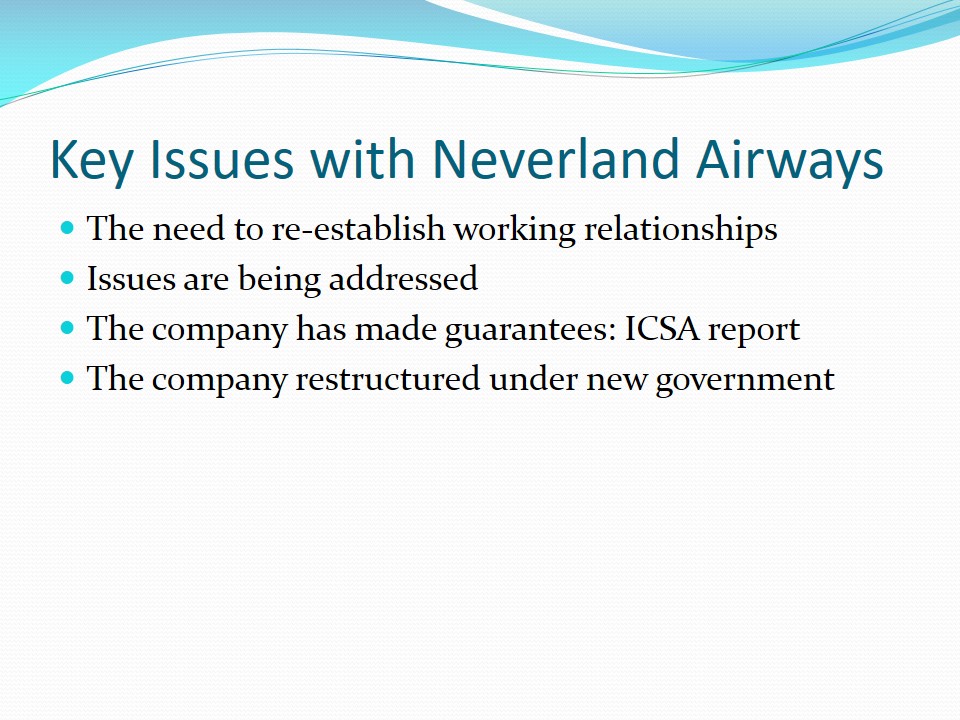
Neverland Airways: Continuation
- Neverland’s economy is recovering.
- Three major airlines have failed.
- The company’s five-year estimates are reasonable.
- Train-Air is their preferred trainer.
- Competition may take the client.
Neverland economy has blossomed. Additionally, three major airlines in the country have failed in the past, thus leaving Neverland as the main airline in the region. The company is looking at a period of rapid expansion. Based on the company’s estimates for growth over the next 5 years, which our market analysts agree are reasonable, the year-to-year annual profit growth of 18 percent is a clear indication that the airline will be financially stable and a worthwhile client to work with.
We are still their preferred training provider. Our competitors, especially the major one, FTT, are highly interested in working with Neverland Airways. FTT is actually looking for trainers who can speak in Neverlandese. This aspect is a clear indication that the airline is a potential worthwhile client that we cannot afford to lose.
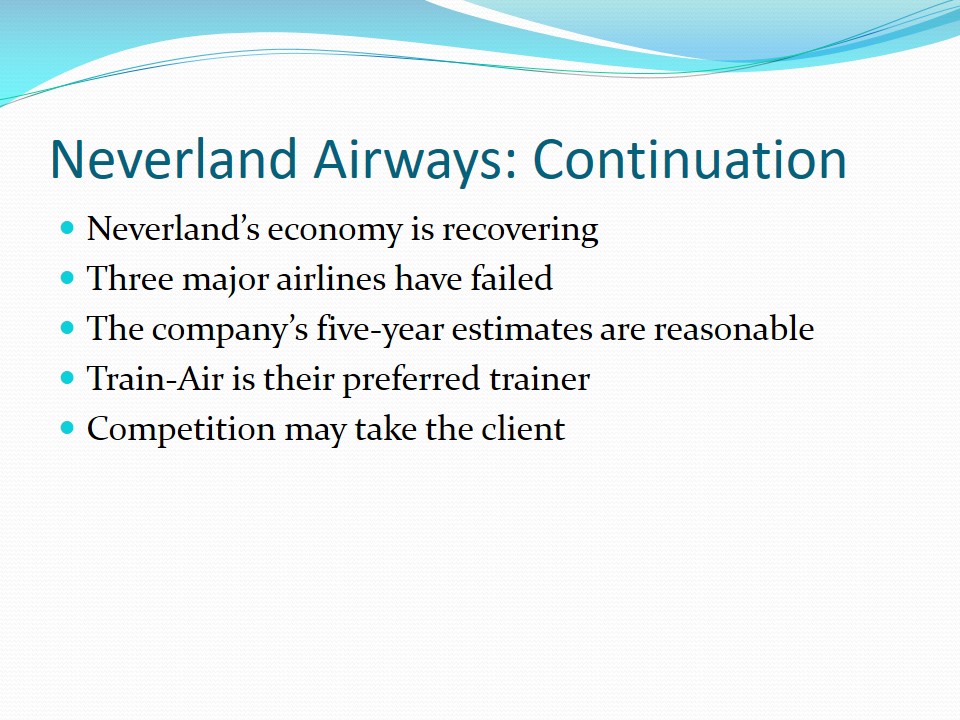
Key Issues: Maris Training
- Maris Training is a reputable company.
- Our current structure of security training.
- Component modules, Basic level, and Advanced.
- Value of component modules and Basic level.
First, we need to consider that Maris Training is a reputable well-established security training provider. It has just been awarded the security contract for 23 shipyards on the Baltic, which speaks to its reputation and competence in the area of security matters.
We also need to evaluate the current structure of our security training, which falls into three areas – Component modules, Basic level, and Advanced). The component modules are obligatory, and they are normally delivered by a range of trainers (not necessarily specialists), thus we could trust a third party to handle this function. The basic level covers the handling and storage of valuables and hazardous materials, secure warehousing, etc…, priced around €250-700 per person. It generates low profits per individual, even though it has a large demand. This function could also be outsourced to a third party.
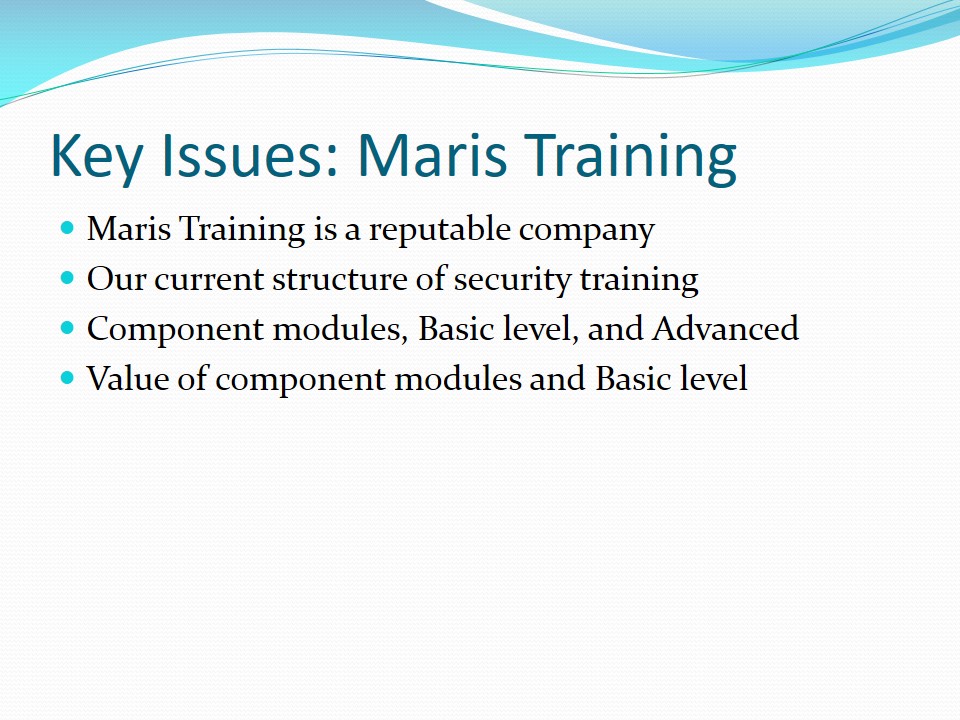
- The prospects of in-house Advanced training.
- Smaller organisations coming up – stiff competition.
- Our security training courses – Flight Services team.
- The benefits of outsourcing.
The advanced level of training is longer and more complex courses, e.g. air marshal, management of hazardous materials and secure environments are offered. Even though it is a smaller area, it has high growth. Average cost is €2,000-€7,000 per person. We also need to consider the fact many smaller training organisations are joining the market with low-cost training courses, and they are likely to affect our current market share. Currently, our safety and security training courses are handled by the Flight Services team, and thus this aspect of our organisation will not be compromised by outsourcing aviation training to a third party. According to Cullen, Lacity, and Willcocks (2014), outsourcing non-core business operations is one of the best ways of reducing operational costs.
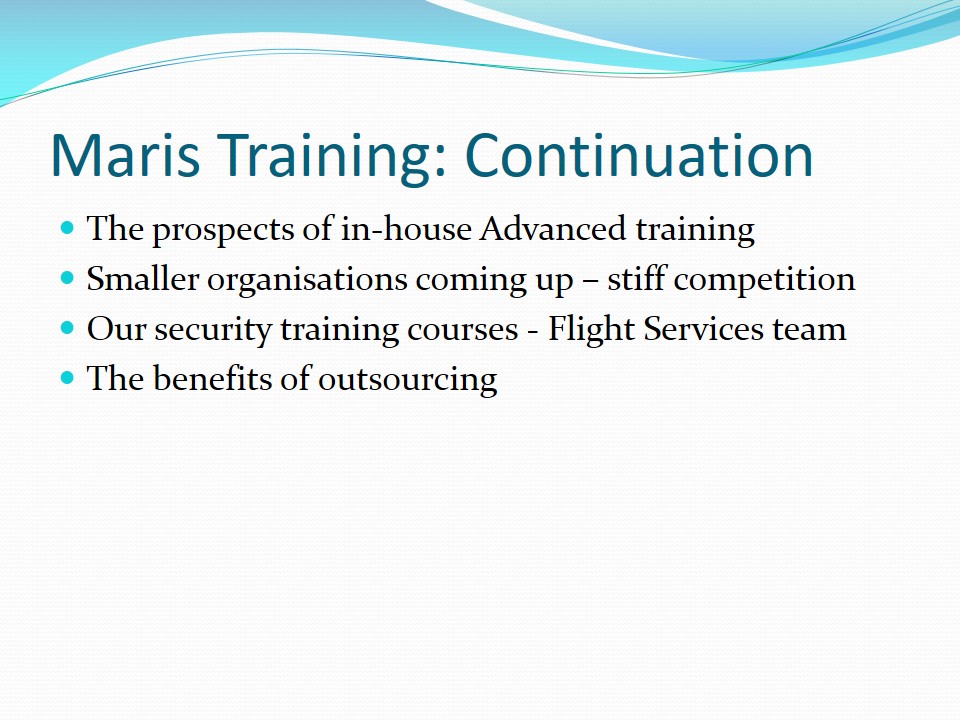
Recommendations: Maris Training
- Outsource partly to Maris Training.
- Develop in-house Advanced Training.
- Component Modules and Basic Level – not highly valuable.
- Merge safety and security training with Advanced Training modules.
We should outsource part of our security to Maris Training and develop our Advanced Training. Maris training is a reputable security training provider, and we can trust them to handle all other training areas except for the Advanced training of our courses. The Component Modules do not need specialist trainers, and thus we do not need to retain this form of training. The basic level generates low profits per individual, even though it has a large demand. Our safety and security training courses should be merged with the Advanced Training modules. Through this strategy, the more senior security officers will be retained. We have the expertise that we need to execute this proposal.
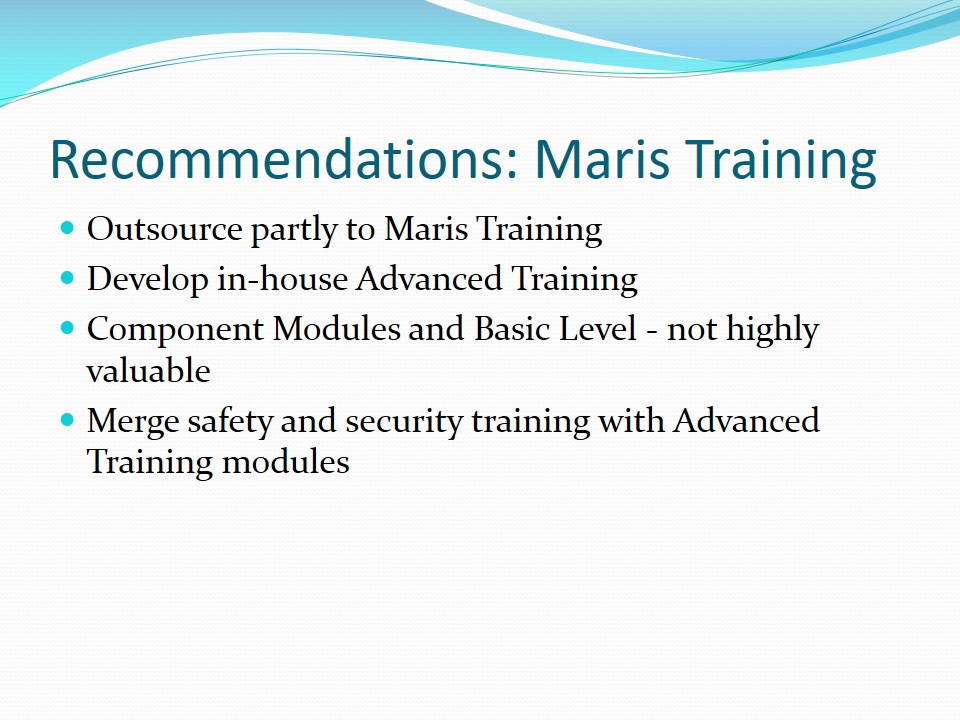
- Advantages of developing an in-house security training.
- Highly trained employees.
- Increased visibility of security expertise.
- Challenges are acknowledged.
- Recent survey results for Aviation users.
- Branding as a prestigious Advanced Training Company.
Developing our in-house security training courses will ensure that our people are highly trained together with increasing the visibility of our security expertise. I acknowledge the challenges associated with this approach. For instance, we will create gaps in our programs (if we focus on Advanced Training only) we may lose customers who prefer to send all employees to the same training organisation. However, in the long-term, our company will benefit from this outsourcing to Maris Training. The recent survey results for Aviation users shows that the merger with 3B Aviation has damaged our reputation for being seen as a luxury provider. We can reclaim our reputation by focusing on Advanced Training and position our brand as prestigious. Specialisation is one of the strategies of building a great and prestigious brand (Elisio 2018; Okrent 2015).
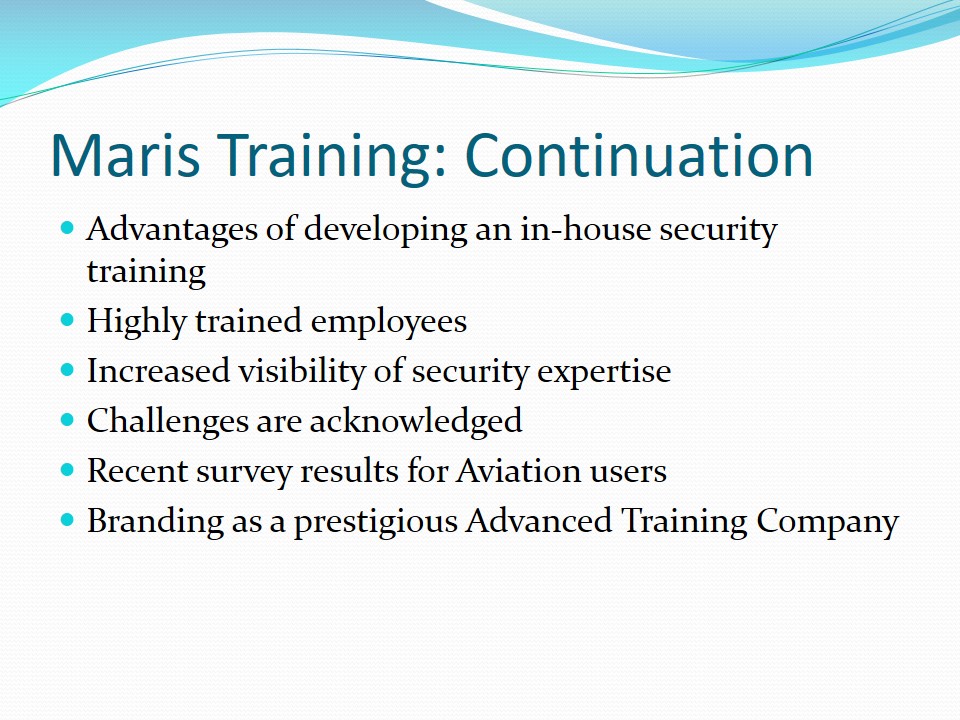
Neverland Airways
- Re-establish working relationship.
- Neverland Airways – a tempting prize for Train-Air.
- Benefits outweigh risks.
- Train-Air can protect its reputation.
- Intense public relations campaigns needed.
We should re-establish a working relationship with Neverland Airways. The company is sufficiently addressing problems prompted the termination of our business engagement. Given that a new government is in place and the company’s projections over the next five years are attractive, we should re-engage this client. Remember, we are still their preferred training provider. Besides, our competitors, especially the FTT, is courting a working relationship with this company. I share the concerns that engaging Neverland Airways might damage our reputation. However, Neverland Airways is a tempting prize for Train-Air, and I think the benefits outweigh the risks. Additionally, we can protect and rebuild our reputation by showing that the company has restructured its operations under the new government. Intense public relations campaigns will play an important role in maintaining our reputation (Kaul & Desai 2014; Dezenhall 2014).
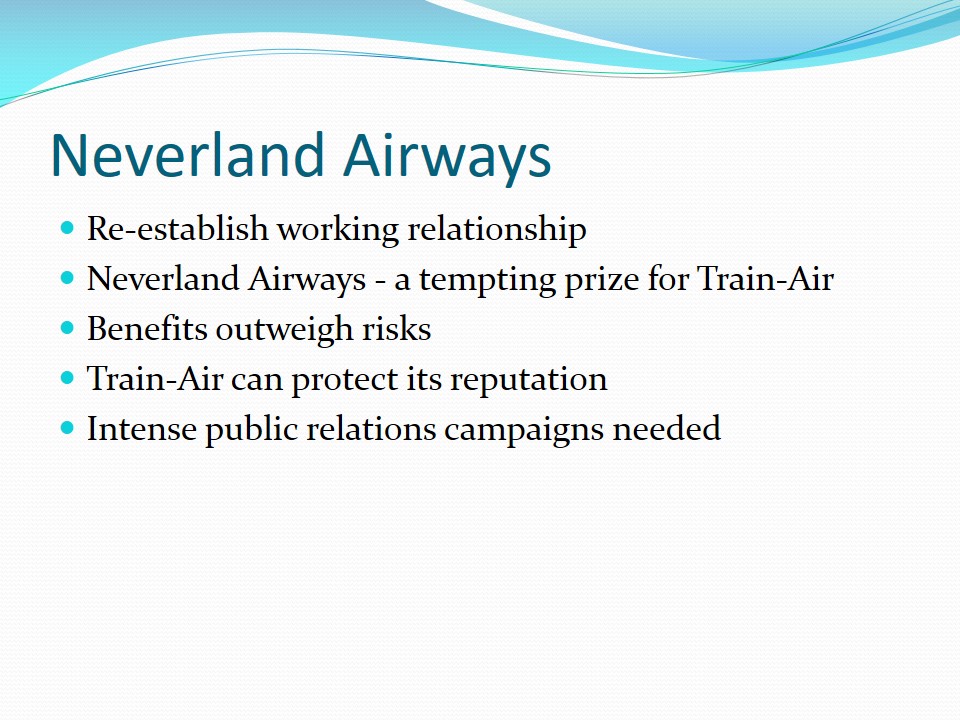
Main Priorities
- Contacting Neverland Airways.
- Meet the senior leadership team in Paris.
- Reiterate our position and conditions.
- Demand proof of restructuring and ethics.
- Commitment to pay Train-Air in time.
The main priorities include contacting Neverland Airways and suggest that we meet their senior leadership team during their time in Paris next week. In the meeting, we need to reiterate our conditions that should be met before we re-establish our business relationship with the company. We should demand proof that the company is operating ethically and ready to pay us on time for training services offered.
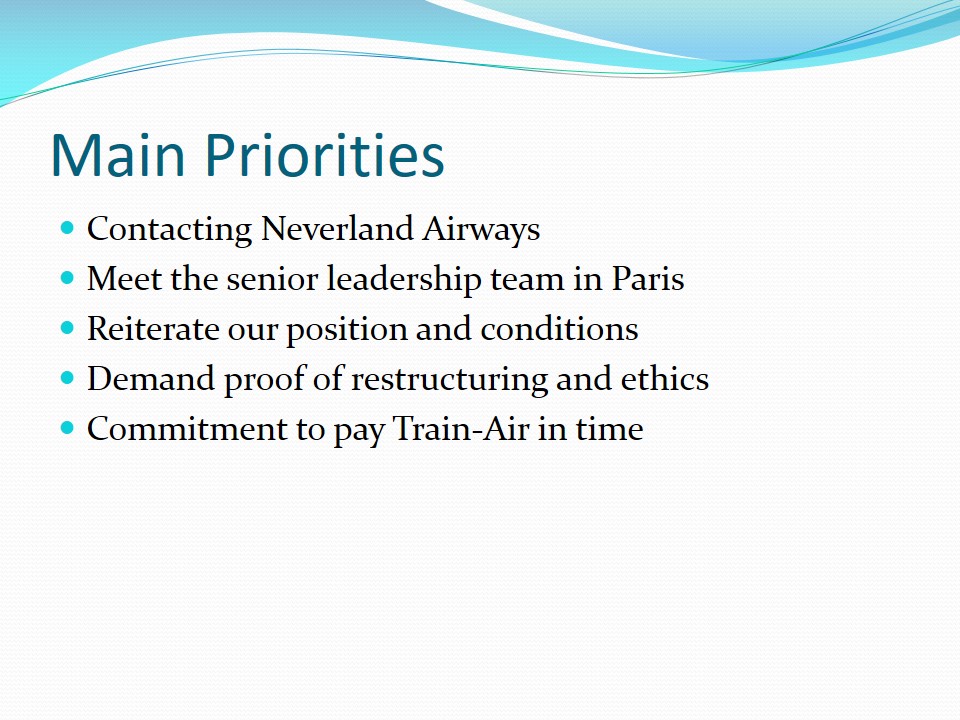
Maris Training
- Contact the senior management.
- State our willingness to outsource.
- Reject the current proposals.
- Propose to retain Train-Air’s Advanced Training courses.
On Maris Training, we need to reach out to the senior management stating our willingness to outsource part of our security training courses to them. We should indicate that we would retain our safety and security training courses, which are handled by the Flight Services team. We should indicate that we do not accept any of their current proposals. They need to restructure the proposal to allow Train-Air to retain its Advanced Training courses.
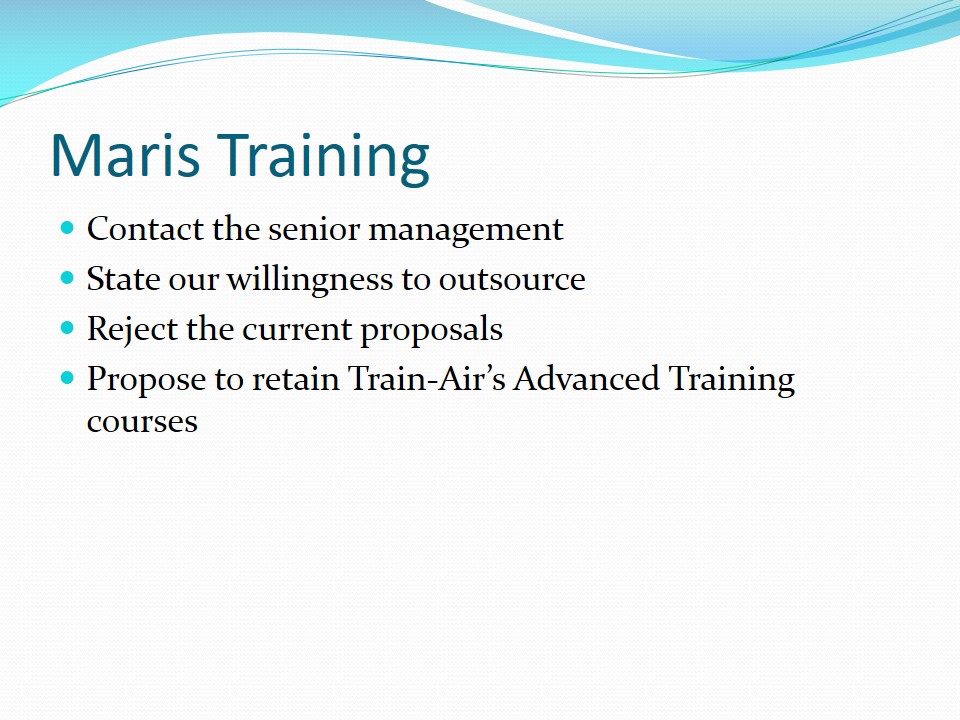
Leaders
- Su Billett, the Director of Train-Air.
- She should lead the meetings.
- Dave Andrews – senior manager within Train-Air.
- To flank Su Billett.
Su Billett, the Director of Train-Air, should take the lead in this meeting. Given that she is not well thought of at Neverland Airways, she should be accompanied by Dave Andrews who used to work in Neverland. He is a senior manager within Train-Air and has a great deal of technical knowledge and expertise. Billett’s approval may go a long way of the re-establishment of our working relationship with Neverland Airways will go a long way. The same team should engage the Maris Training management and negotiate the outsourcing terms.
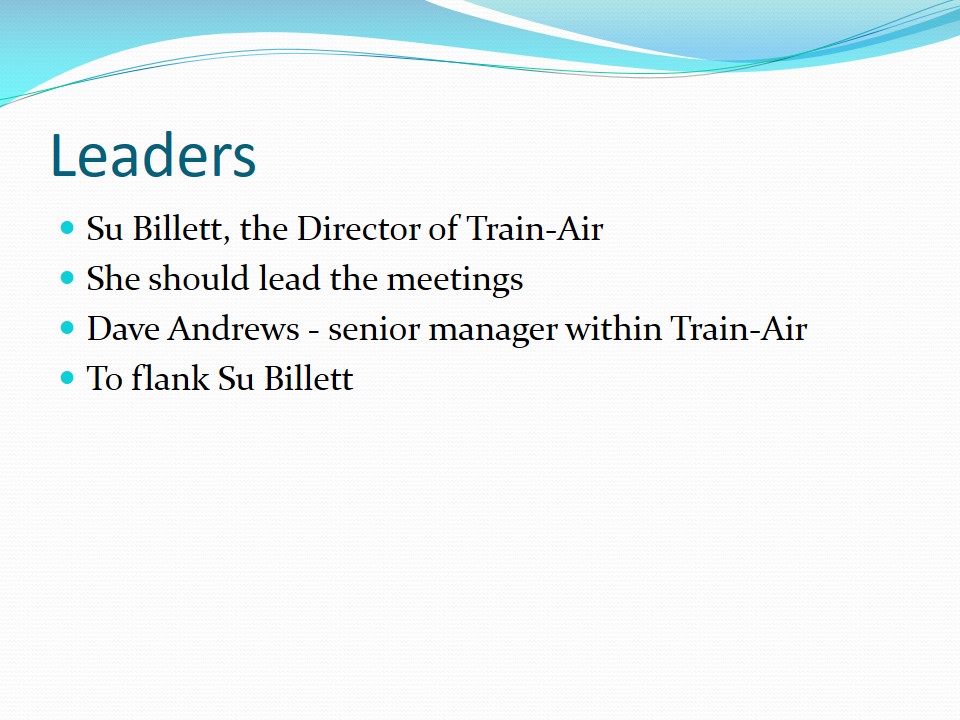
References
Cullen, S, Lacity, M & Willcocks, L 2014, Outsourcing – all you need to know, Penguin Random House, London.
Dezenhall, E 2014, Glass jaw: a manifesto for defending fragile reputations in an age of instant scandal, Twelve Hachette Book Group, New York.
Elisio, C 2018, ‘Brand portfolio strategy and brand architecture: a comparative study’, Cogent Business & Management, vol. 5, no. 1, pp. 1-10.
Kaul, A & Desai, A 2014, Corporate reputation decoded: building, managing and strategising for corporate excellence, Sage, Thousand Oaks.
Okrent, D 2015, Forging a great brand – the brand architecture workshop: leader’s guide and worksheets, Okrent Consulting Services, Seattle.